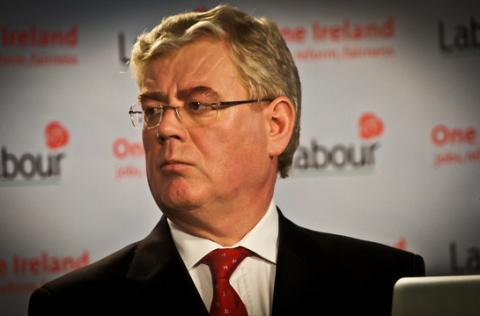Gilmore has sold out more than just Shortall

When it's eventually all over, of what exactly will Labour's leading lights be proud? By Vincent Browne.
Eamon Gilmore's excruciation during his interview on 27 September with Richard Crowley of RTÉ betrayed a realisation that his failure to stand by Róisín Shortall was not just an act of personal disloyalty, but of disloyalty to what Labour supposedly stands for, and of disloyalty to the constituency which the party supposedly represents.
Not much will occur by way of reaction to this in the next while, but Gilmore has burned his boats of refuge when, inevitably, the reckoning occurs.
This was not just a row between two ministers who could not stand each other on a personal level. The cleavage between Shortall and James Reilly was deeply political.
It was about priorities, about whether the focus of policy should be on creating an equality of care and administration in the health service or, as usual, letting it all be determined by market forces, with a bit of political favouritism thrown in.
Shortall clearly set out the stark political choices that had to be made in health in her Dáil speech and her resignation statement: "Do we increase prescription charges for medical card patients or reduce the drugs bill? Do we cut public health nurses or collect money owed by insurance companies? Do we cut home help or impose a cap on consultants' pay? What model of universal health insurance best suits the situation here in Ireland? Should it be a commercial insurance model, or a social insurance model?"
And while we're at it, were decisions on health infrastructure and staffing to be made in the public interest based on health need, or driven by other concerns?
Shortall went on: "It is no longer possible for me to fulfil my role as Minister of State for primary care because of lack of support for the reforms in the Programme for Government and the values which underpin it" - clearly implying that Gilmore was not just letting her down, but letting down the policies mandated in the election.
The thrust of Gilmore's leadership is now about avoiding or blurring the hard political choices between priorities, in part to flinch from tensions with Fine Gael, and in part to flinch from the annoying middle-class voters about whom Labour cares so much.
At a Labour Party think-in at some very posh venue in Kildare a few weeks ago, Gilmore said that Labour ministers were not going to flinch from the tough decisions that needed to be taken in the coming budget.
Well, he sure as hell flinched when it came to standing by Shortall and the Programme for Government. And we can expect him to flinch again when Fine Gael insists that the burden of the further €3.5 billion adjustments that are to be made in the December budget will afflict the vulnerable.
In June 1994, Proinsias De Rossa - speaking on behalf of himself, Gilmore, Pat Rabbitte and the others in Democratic Left - had this to say about the Labour Party: "Who can point to a single issue in the economic area where this government has adopted a position, or taken a decision, that might not have also been taken by the previous Fianna Fáil-Progressive Democrats administration or the minority Fianna Fáil government which went before that? Has the Labour presence led to any new radical approach to the unemployment problem or new measures to secure an equal distribution of wealth?
"There is no evidence of that . . . far from being in partnership with Fianna Fáil, the Labour Party has now been almost totally assimilated into the political culture which the Tánaiste [Dick Spring] spoke of in such withering terms in the dying days of the last Dáil."
Is this not precisely what has happened now with the merged Labour/Democratic Left?
Who can point to a single issue in the economic area where this government has adopted a position or taken a decision that might not have also been taken by the previous Fianna Fáil-Greens government?
Isn't it true that, far from Labour being in partnership with Fine Gael, the former has now been almost totally assimilated into the political culture of the latter?
Almost every time that Labour is challenged on the choices this government makes, its spokespeople go into a diversionary monologue about the precarious condition in which they were bequeathed the governance of the state, and how they have brought us back from the precipice and restored Ireland's reputation abroad, as though that explains the choices they have made.
They have opted to inflict hardship on the poorest, while leaving the richest relatively untouched.
As for bringing us back from the precipice, we are not back from the precipice as a state (we were never near the precipice as a society, for we are still one of the richest countries in the world).
The precipice still looms because of the massive debt burden that this government has failed to ameliorate.
It was the previous acts of the outgoing government, via the budget of 2011 and its previous three budgets, that did most to bring us back from the fiscal precipice.
For many of Labour's leading lights, this is the last hurrah, partly because of the wholesale slaughter that the party is in for at the next election; for others, because of the march of time (Ruairi Quinn will be 70 at the next election, Pat Rabbitte and Joan Burton will be 67).
When it's eventually all over, of what exactly will they be proud?
Image top: infomatique.
